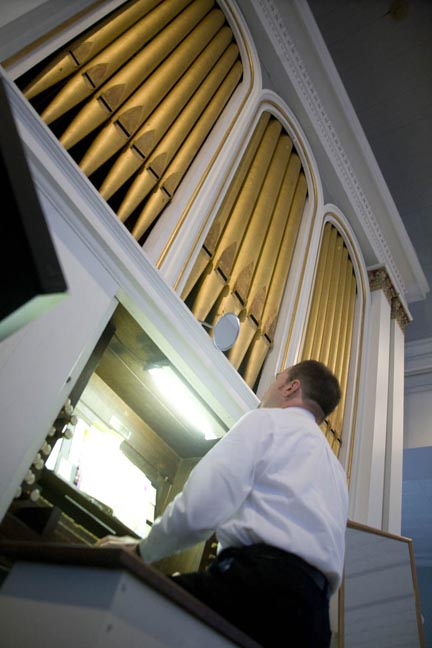Caroling is all about alcohol, traditionally. “This time of year is about being with friends singing carols, and being in a pub drinking good beer,” Peter R. Boak, director of the Island Community Chorus, told his audience at a performance in the Edgartown Old Whaling Church this Sunday, making a misleading distinction.
When it first became popular, in medieval England, caroling was like Halloween but with drinks instead of candy. Cursor Mundi, an English cleric’s religious poem dating back to 1300, describes how December revelers would hit the town to sing as part of ‘wassailing’ — middle-English for ‘a festivity with much drinking.’ This involved going door to door to belt out carols in return for bowls — rather than cups, or glasses — of cider and wine. The whole practice of caroling was regularly denounced by zealous clergymen here and in Britain up to the 19th century, before the form was widely adopted by the church. And though there is an undeniable religious element to subject matter carols of today, traditionally the muse was booze.
The Island Community Chorus was not inebriated, at least not visibly so, when it performed to a packed crowd in the Old Whalers Church this last Sunday, but then it was only 3 p.m. — not quite beer o‘clock — and it was a rather more upmarket affair than those to which the average medieval peasant was accustomed.
More than a hundred Island-sourced tenors, basses, altos and sopranos produced a gargantuan sound only just contained by the high walls of the Whaling Church. Among the accompanists were Peter R. Boak, Sophia Saunders-Jones on flute, and organist Garrett Brown.
Good Ale, a carol from the 15th century, is a thematically strict piece wherein various consumables are turned down in favour of a decent beer:
“Bring us in no capon’s [goose] flesh, for that is often dear, Nor bring us in no duck’s flesh, for they slobber in the mere [lake], But bring us in good ale!”
The carol formed part of a suite which the chorus has been practicing at rehearsals at least once a week since early September. The 20-minute piece, entitled A Winter Icicle, was composed by the world’s preeminent choral composer John Rutter. It puts to music two Shakespeare passages, from As You Like It and Twelfth Night, the Thomas Campion poem Winter Night, and three anonymous carols, including the aformentioned ale ode.
The chorus went on to deliver a superlative rendition of Jingle Bells, the famous ditty describing Santa Claus’s annual sleigh ride, which, considering the amount of sherry and beer left out for the man, is more of an extended pub crawl than anything else. Mr. Boak also entreatied the audience to join in for the altogether more sober Silent Night.
A reception, with wine, followed the performance.






Comments
Comment policy »